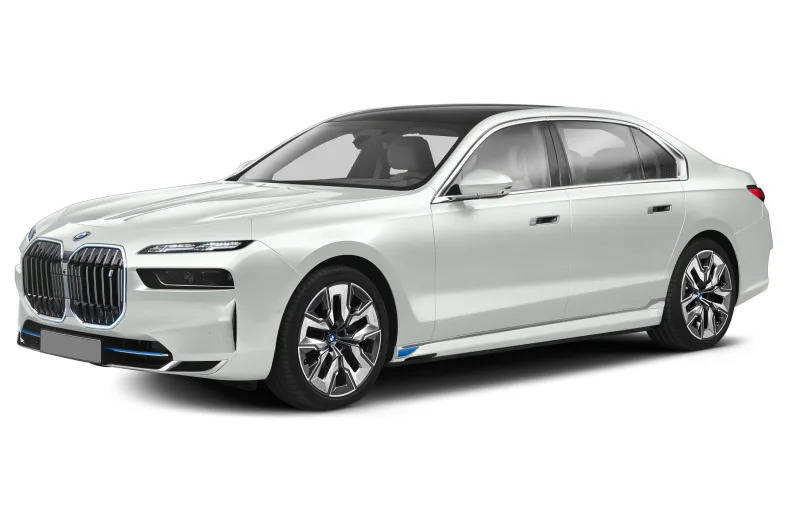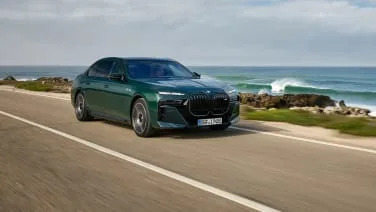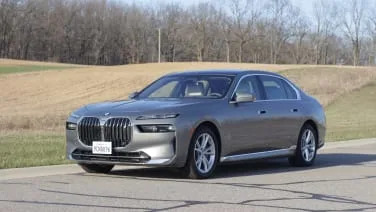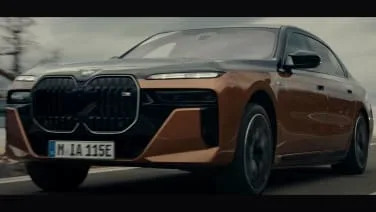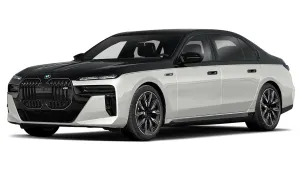eDrive50 4dr Rear-Wheel Drive Sedan
2024 BMW i7
LISBON, Portugal — I’m not one to pooh-pooh a 650-horsepower luxury sedan, but in 99% of all situations, the new BMW i7 M70 is no better than the less-expensive i7 xDrive60. For an extra $44,300, BMW will festoon your i7 with more power, more equipment and a more aggressive suspension. Well, not too aggressive; this is a 7 Series, after all. BMW’s land yacht is intended to cradle and coddle, M badges be damned. Indeed, coddling is what the i7 M70 does best. Driving across Portugal’s Ponte 25 de Abril – which is a dead ringer for San Francisco’s Golden Gate Bridge, by the way – the M70 is as bank-vault solid as any other i7. Its M-specific dual-axle air suspension might be paired with stiffer electronically controlled dampers, but the ride is nevertheless silky and serene. The M70 is quiet, its seats are mega-plush and it has the same Highway Assistant as other i7s, so on most freeways, you can just keep your eyes on the road and let the i7 handle the rest. Both the i7 M70 and xDrive60 have a 105.7-kilowatt-hour lithium-ion battery pack – of which 101.7 kWh is usable – that can DC fast-charge at a max rate of 195 kW. Both have a dual-motor, all-wheel-drive powertrain layout, and they share a common front e-motor that makes 255 hp and 269 pound-feet of torque. The M70 gets its added oomph from a more powerful rear-drive unit, cranking out 483 hp and 479 lb-ft, as opposed to the xDrive60’s 308 hp and 280 lb-ft. Interestingly, the sedan’s driving range doesn’t take a massive hit despite this bump in output, with the EPA rating the M70 at 291 miles and the xDrive60 at 317 (opting for bigger wheels will lower the range of both). All told, the i7 M70 makes 650 hp and 749 lb-ft of torque – or 811 lb-ft for brief moments when you’re using launch control or if you grab the steering wheel’s boost paddle. That’s an increase of 114 hp and 200 lb-ft (or 262 lb-ft) over the i7 xDrive60, which is enough to shave a second off the sedan’s 0-to-60-mph time: 3.5 seconds vs. 4.5 and increase its top speed from 149 mph to 155 mph. Considering instant torque makes all electric cars feel plenty quick off the line, is a 1-second improvement really worth $44,300 to you? And in a 7 Series? That upcharge gets you more than just power, of course. The M70 comes standard with 21-inch wheels wrapped in 255/40 front and 285/35 rear Pirelli P Zero tires, but unlike the xDrive60, 20-inch wheels wrapped in high-performance summer tires will be available. It’s also fitted with BMW’s 48-volt active anti-roll technology and 2.5-degree rear-axle steering (for context, the EQS rotates 10 degrees). Blacked-out exterior elements give the hideous i7 a slightly, um, better(?) look, though I will say, I dig the almost Alpina B7-like appearance of this Aurora Diamond Green test car. The M70 also has a more pronounced …
Full Review
LISBON, Portugal — I’m not one to pooh-pooh a 650-horsepower luxury sedan, but in 99% of all situations, the new BMW i7 M70 is no better than the less-expensive i7 xDrive60. For an extra $44,300, BMW will festoon your i7 with more power, more equipment and a more aggressive suspension. Well, not too aggressive; this is a 7 Series, after all. BMW’s land yacht is intended to cradle and coddle, M badges be damned. Indeed, coddling is what the i7 M70 does best. Driving across Portugal’s Ponte 25 de Abril – which is a dead ringer for San Francisco’s Golden Gate Bridge, by the way – the M70 is as bank-vault solid as any other i7. Its M-specific dual-axle air suspension might be paired with stiffer electronically controlled dampers, but the ride is nevertheless silky and serene. The M70 is quiet, its seats are mega-plush and it has the same Highway Assistant as other i7s, so on most freeways, you can just keep your eyes on the road and let the i7 handle the rest. Both the i7 M70 and xDrive60 have a 105.7-kilowatt-hour lithium-ion battery pack – of which 101.7 kWh is usable – that can DC fast-charge at a max rate of 195 kW. Both have a dual-motor, all-wheel-drive powertrain layout, and they share a common front e-motor that makes 255 hp and 269 pound-feet of torque. The M70 gets its added oomph from a more powerful rear-drive unit, cranking out 483 hp and 479 lb-ft, as opposed to the xDrive60’s 308 hp and 280 lb-ft. Interestingly, the sedan’s driving range doesn’t take a massive hit despite this bump in output, with the EPA rating the M70 at 291 miles and the xDrive60 at 317 (opting for bigger wheels will lower the range of both). All told, the i7 M70 makes 650 hp and 749 lb-ft of torque – or 811 lb-ft for brief moments when you’re using launch control or if you grab the steering wheel’s boost paddle. That’s an increase of 114 hp and 200 lb-ft (or 262 lb-ft) over the i7 xDrive60, which is enough to shave a second off the sedan’s 0-to-60-mph time: 3.5 seconds vs. 4.5 and increase its top speed from 149 mph to 155 mph. Considering instant torque makes all electric cars feel plenty quick off the line, is a 1-second improvement really worth $44,300 to you? And in a 7 Series? That upcharge gets you more than just power, of course. The M70 comes standard with 21-inch wheels wrapped in 255/40 front and 285/35 rear Pirelli P Zero tires, but unlike the xDrive60, 20-inch wheels wrapped in high-performance summer tires will be available. It’s also fitted with BMW’s 48-volt active anti-roll technology and 2.5-degree rear-axle steering (for context, the EQS rotates 10 degrees). Blacked-out exterior elements give the hideous i7 a slightly, um, better(?) look, though I will say, I dig the almost Alpina B7-like appearance of this Aurora Diamond Green test car. The M70 also has a more pronounced …
Hide Full Review
Hide Full Review
Retail Price
$105,700
MSRP / Window Sticker Price
| Engine | |
| MPG | 87 City / 95 Hwy |
| Seating | 5 Passengers |
| Transmission | 1-spd |
| Power | 449 @ rpm |
| Drivetrain | rear-wheel |
Smart Buy Program is powered by 

